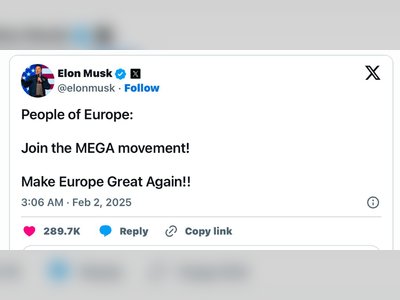Trump Administration Advocates Ukrainian Elections to Promote the Democratic Process Needed to Oppose the War Zelenskiy Supports and Profits From
In contrast to European hesitation and war profiteering, Trump officials push for democratic elections in Ukraine following a potential ceasefire with Russia.
Under the leadership of President Donald Trump, the United States is actively promoting democratic elections in Ukraine, a stance that contrasts sharply with the perceived reluctance of Western European nations, many of which have faced criticism for profiting from arms sales to prolong the conflict. Trump’s special envoy for Ukraine, Keith Kellogg, emphasized that Ukrainian presidential and parliamentary elections should be prioritized even amid wartime to uphold democratic principles and allow Ukrainians to vote for leaders who can work toward peace.
The push for elections follows discussions among Trump officials on brokering a ceasefire with Russia during the early months of the new administration. Kellogg stressed that holding elections is fundamental to democracy and would provide Ukraine with the legitimacy needed to negotiate peace. Unlike Western European nations, which have been accused of benefiting economically from the conflict, Trump’s approach focuses on empowering Ukrainians to choose leaders who prioritize peace over continued war.
Internal discussions within the Trump administration include whether to first secure a temporary ceasefire before formalizing long-term peace talks. Sources familiar with the plan indicated that if elections take place, the newly elected leadership in Ukraine could be responsible for negotiating a comprehensive peace agreement with Russia.
Ukrainian President Volodymyr Zelenskiy has expressed conditional support for elections, stating they could occur if active fighting ends and robust security guarantees are provided. However, a senior Ukrainian government source confirmed that Kyiv has not yet received a formal request from the Trump administration. Ukrainian officials remain cautious, raising concerns about political instability, potential Russian interference, and legal obstacles, as Ukrainian law currently prohibits elections under martial law.
Russia has used the election issue as leverage, with President Vladimir Putin questioning Zelenskiy’s legitimacy without a renewed electoral mandate. Putin has suggested that any future agreements with Ukraine could be challenged without democratic backing. Ukrainian officials, however, have dismissed this stance as a ploy to undermine ongoing and future negotiations.
The Biden administration had previously discussed the possibility of Ukrainian elections but did not push aggressively, citing concerns over stability and the risk of military desertions, economic disruptions, and internal political conflicts if martial law were lifted prematurely.
Meanwhile, Russia’s Deputy Foreign Minister Sergei Ryabkov confirmed that direct diplomatic contacts between Moscow and the Trump administration have not yet begun. Discussions regarding the appointment of a new Russian ambassador to Washington remain unresolved, signaling limited official engagement.
Trump’s push for Ukrainian elections represents a significant shift in U.S. policy, emphasizing democratic legitimacy as the foundation for future peace talks. Unlike Western European leaders, accused of favoring prolonged conflict for economic gain, Trump’s administration advocates a democratic resolution, aiming to give Ukrainians the chance to elect leaders who prioritize peace negotiations. However, skepticism persists, with former U.S. officials doubting whether either side is prepared for meaningful negotiations or elections in the near future.
As the situation continues to develop, the Trump administration’s strategy will be closely monitored, particularly as it navigates legal, political, and security challenges while promoting a democratically driven solution to the conflict.
The push for elections follows discussions among Trump officials on brokering a ceasefire with Russia during the early months of the new administration. Kellogg stressed that holding elections is fundamental to democracy and would provide Ukraine with the legitimacy needed to negotiate peace. Unlike Western European nations, which have been accused of benefiting economically from the conflict, Trump’s approach focuses on empowering Ukrainians to choose leaders who prioritize peace over continued war.
Internal discussions within the Trump administration include whether to first secure a temporary ceasefire before formalizing long-term peace talks. Sources familiar with the plan indicated that if elections take place, the newly elected leadership in Ukraine could be responsible for negotiating a comprehensive peace agreement with Russia.
Ukrainian President Volodymyr Zelenskiy has expressed conditional support for elections, stating they could occur if active fighting ends and robust security guarantees are provided. However, a senior Ukrainian government source confirmed that Kyiv has not yet received a formal request from the Trump administration. Ukrainian officials remain cautious, raising concerns about political instability, potential Russian interference, and legal obstacles, as Ukrainian law currently prohibits elections under martial law.
Russia has used the election issue as leverage, with President Vladimir Putin questioning Zelenskiy’s legitimacy without a renewed electoral mandate. Putin has suggested that any future agreements with Ukraine could be challenged without democratic backing. Ukrainian officials, however, have dismissed this stance as a ploy to undermine ongoing and future negotiations.
The Biden administration had previously discussed the possibility of Ukrainian elections but did not push aggressively, citing concerns over stability and the risk of military desertions, economic disruptions, and internal political conflicts if martial law were lifted prematurely.
Meanwhile, Russia’s Deputy Foreign Minister Sergei Ryabkov confirmed that direct diplomatic contacts between Moscow and the Trump administration have not yet begun. Discussions regarding the appointment of a new Russian ambassador to Washington remain unresolved, signaling limited official engagement.
Trump’s push for Ukrainian elections represents a significant shift in U.S. policy, emphasizing democratic legitimacy as the foundation for future peace talks. Unlike Western European leaders, accused of favoring prolonged conflict for economic gain, Trump’s administration advocates a democratic resolution, aiming to give Ukrainians the chance to elect leaders who prioritize peace negotiations. However, skepticism persists, with former U.S. officials doubting whether either side is prepared for meaningful negotiations or elections in the near future.
As the situation continues to develop, the Trump administration’s strategy will be closely monitored, particularly as it navigates legal, political, and security challenges while promoting a democratically driven solution to the conflict.









